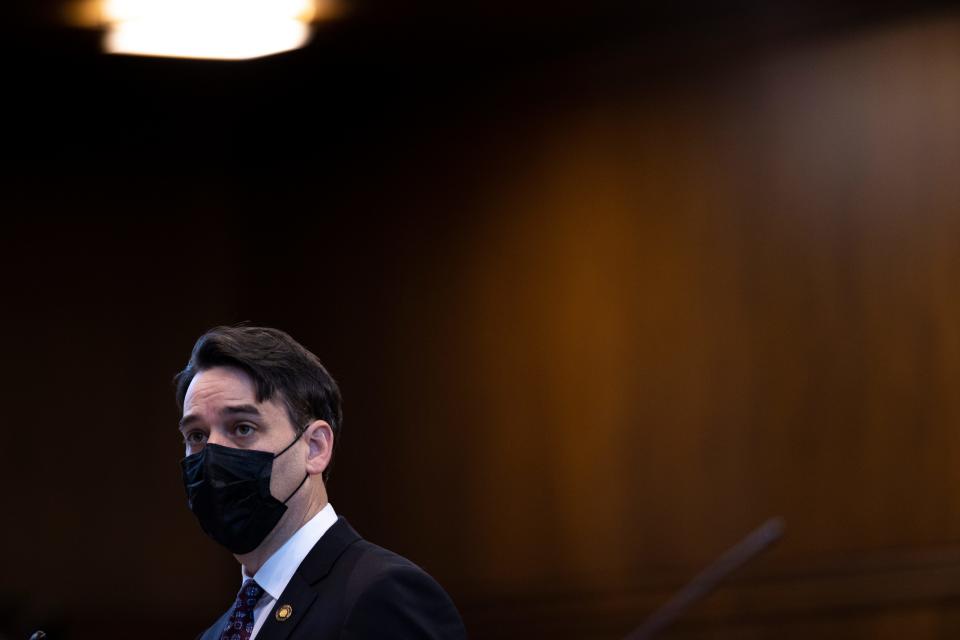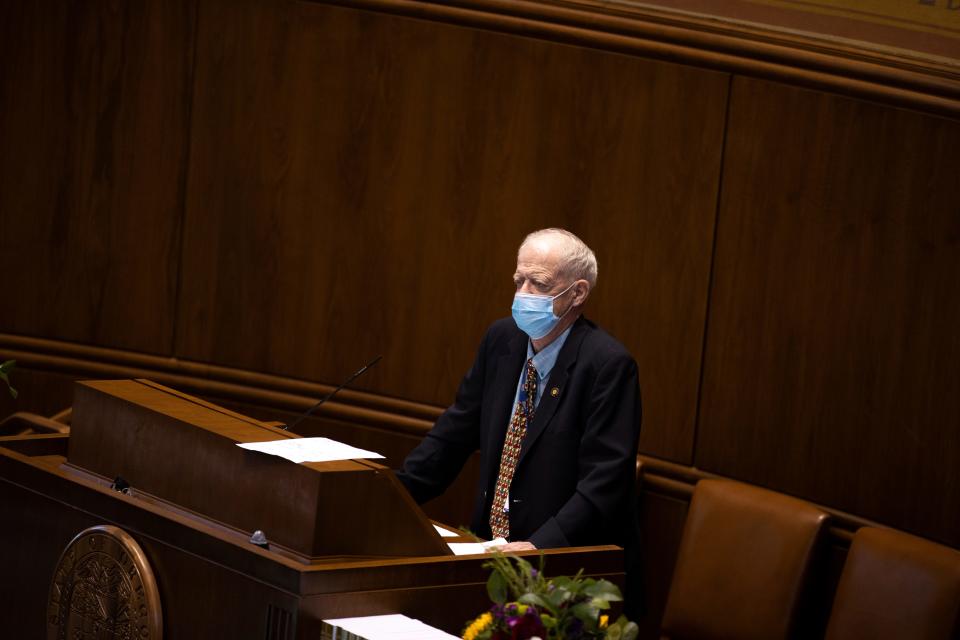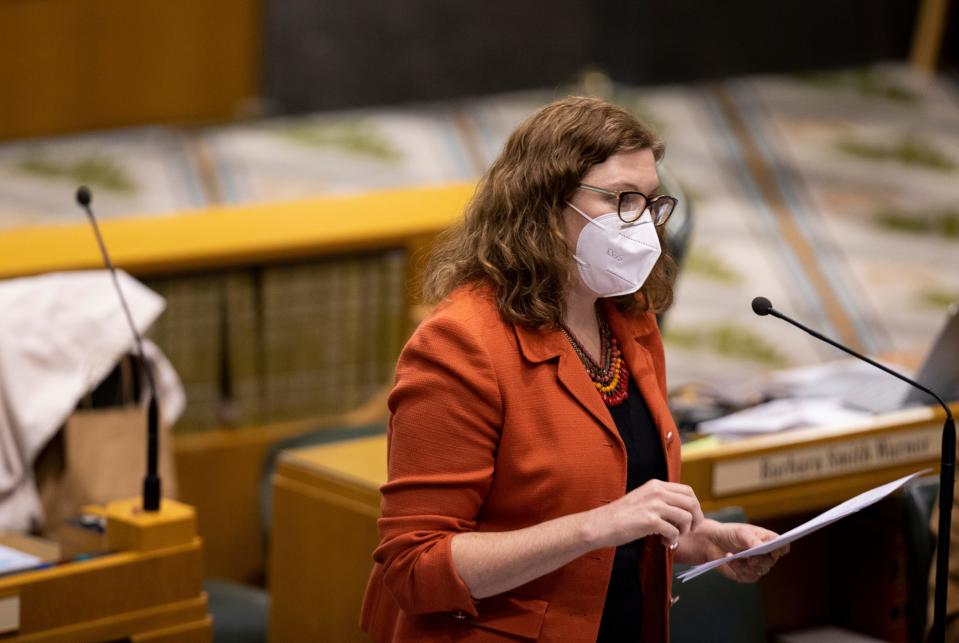Oregon's short legislative session begins with a focus on jobs, climate, education
- Oops!Something went wrong.Please try again later.
Oregon's 35-day legislative session begins Tuesday, with lawmakers preparing to consider more than 250 bills and allocate between $1.5 and $2 billion in funding, all under an inexperienced group of new leaders.
The budget is expected to be a top priority for Democrats, but among the key policy proposals will be efforts to aid a workforce battered by the pandemic, respond to climate change-related disasters, improve access to mental health care and support educators and school staff.
"(Oregonians) want us focused on solving problems and not on the back-and-forth that sometimes happens in politics," House Democratic Leader Julie Fahey, D-Eugene, said. "There is so much at stake this session and so many challenges for us to work on."
Democratic proposals
Democratic Gov. Kate Brown's biggest proposal is a $200 million workforce investment package dubbed Future Ready Oregon 2022 that targets the health care, manufacturing and construction sectors. The majority of the funds would bolster existing career pipeline programs and create "competitive workforce readiness grants."
“We make these investments now and it will help the state’s workforce blossom,” Brown said. "We’re planting the seeds. I expect to get some short-term benefit, but I also expect to get some long-term benefit."
Meanwhile, Secretary of State Shemia Fagan, also a Democrat, is supporting bills that would allow adults in custody to vote, establish penalties for harassment of elections workers and allow Oregonians to register to vote online with a Social Security number.
Local proposals: Money for college athletes, ethnic studies among Salem-area lawmakers' plans for 2022
Her office is also requesting money to modernize the state's voter registration and election management system and hire more staff within the Oregon Elections Division.
"Today our elections are the gold standard in safety, security and participation," Fagan said in a statement. "As the nation faces an unprecedented attack on voting rights, we are called to lead once again."

Republican priorities
Republican leaders have said they could see their caucuses supporting some of these priority measures — depending on the details — particularly around paying essential workers and aspects of the workforce investment plan.
The reality of lawmaking in Oregon is that the majority of bills pass with bipartisan support — typically only a small number of controversial or high-profile bills generate widespread acrimony.
However, certain bills, including one that would require agricultural workers receive overtime pay, are already seeing pushback from GOP leadership.
House Republican Leader Vikki Breese-Iverson, R-Prineville, called the bill "the elephant in the room" and said the workgroup discussing the issue in the interim "broke down" and needed more information and data before agreeing on legislation.
"We're not taking the time and going through the whole issue in a way that will bring us an outcome that's real for all Oregonians, both employers and employees," Breese-Iverson said.
The minority party has introduced legislation that would invest in law enforcement, thin and treat forests for wildfire protection and reform certain tax measures.
They are also seeking to limit the powers of the executive branch in emergency situations, having said frequently during the pandemic that the Governor's Office retains too much power with too little legislative oversight.
But mostly what Republicans want is a trimmed-down, focused session.

The point of the short session
Republicans have long argued Democrats misuse the even-year "short" sessions by straying from the guidelines Oregonians expected to be in place when they approved annual sessions via ballot measure in 2010.
"We want to see a constitutional session in both word and spirit," Senate Republican Leader Tim Knopp, R-Bend, said. "I'd really like to see us focus on the budget and emergencies and technical fixes as this was sold to the people of Oregon."
Supporters of utilizing the session more broadly say it doesn't make sense to delay addressing problems when lawmakers are already in the Capitol and have the ability to pass legislation.
Moreover, they say, after the cascading crises of the past two years and the 2022 session being the first short session since the pandemic began, there is plenty the Legislature should be doing.
House speaker nominee Rep. Dan Rayfield, D-Corvallis, said lawmakers are in a "fortunate" position to be in session, be aware of the problems Oregonians face and have the funds to address some of those issues.
"We are continuing to come out of a crisis," Rayfield said. "People across Oregon … are fatigued, we're tired, but there's still an immense amount of work to be done. Short sessions were built for this exact moment."

The majority of that $1.5 to $2 billion available to the Legislature is one-time federal dollars, so lawmakers are hesitant to put it toward new programs that would need continual funding beyond this biennium.
The exact amount lawmakers have to utilize won't be known until the state's next revenue forecast is released Feb. 9.
Democrats have supermajority control of both chambers, meaning they can pass any policy or revenue-raising bill without support from any Republicans. However, Republicans still have ways to impact the session beyond the negotiating table, from requiring bills be read in full before final passage, to a quorum-denying walkout.
But, at least so far, these contentious tactics have not been publicly threatened for this session — unlike during the fight over the greenhouse gas emissions cap-and-trade bills from the 2019 and 2020 sessions.
Oregon governors: My search for a portrait of my great-great-grandfather and a chapter of our family history
The ambitious climate change legislation failed after a walkout in 2019, so Democrats reintroduced a modified version in 2020, sparking early fears that another walkout was inevitable.
Those expectations were realized when the majority party moved toward a vote on Senate Bill 1530, triggering a walkout by Republicans in both chambers.
The walkout denied Democrats the two-thirds quorum they needed to pass the bill, but also prevented the passage of dozens of other bills, many of which had bipartisan support. Lawmakers only passed three of the 258 bills introduced in 2020.

New leaders take over
Leadership on both sides are hoping for a more successful session this time around.
“There’s still so much to do. This session’s a big one and it’s got me so worried," Senate President Peter Courtney, D-Salem, said. "We’ve had so many surprises.”
The surprises Courtney is referring to are the departures of many legislative leaders in recent weeks.
Three of the four caucus leaders were newly elected to their positions ahead of this session: Knopp, Breese-Iverson and Fahey. The only one with experience in the role is Senate Democratic Leader Rob Wagner, D-Lake Oswego, who only got the job in May 2020.
Long-time House speaker Tina Kotek stepped down in mid-January to focus on her campaign for governor, elevating Rayfield to speaker nominee.
And 2022 is set to be the last legislative session for both Courtney and Brown.
Courtney said he was "panicked" about the session about a week ago; he didn't yet have enough information about budget requests or bills. And the tightened deadlines of the maximum 35-day legislative session will only place further pressure on new leadership.
“The Legislature can’t run without people pushing, keeping up with deadlines,” Courtney said. “You constantly got to get people working hard way ahead of time if you’re going to finish.”
Reporter Connor Radnovich covers the Oregon Legislature and state government. Contact him at cradnovich@statesmanjournal.com or 503-399-6864, or follow him on Twitter at @CDRadnovich.
This article originally appeared on Salem Statesman Journal: Oregon legislative session starts begins with focus on jobs, climate

